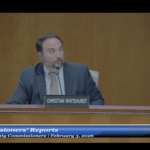City Commission directs staff to improve conditions while keeping historic tourist attraction; residents demand transparency and animal welfare reforms
The St. Augustine City Commission held an extensive discussion on October 13, 2025, about the city’s horse-drawn carriage industry following passionate testimony from both animal welfare advocates and carriage operators.
Current Operations Under Review
Assistant City Manager Corey Sackred presented a comprehensive review of the franchise agreements governing 14 active carriage permits in the city. The industry operates from two city-owned facilities on Riberia Street: a transfer station serving four operators and a one-acre property leased to one operator with 10 permits.
Sackred identified several areas where the city has not enforced its own 2011 ordinances, including failure to collect updated horse inventories from operators, lack of approval for charter routes, and missing documentation that should be displayed during tours.
“The city had traditionally utilized the veterinarian inspections in May and November every year as their horse inventory,” Sackred explained. “But right on the franchise agreement, it says that the city will have a list and then they will turn them in.”
The city also discovered that franchise fees have fallen short of ordinance requirements. Operators must pay either $1,000 per permit or 2.5% of gross revenue, whichever is higher, but most have been paying only the $1,000 minimum.
Animal Welfare Concerns
Multiple residents presented allegations of abuse, including police reports and video evidence. Patricia Ramos referenced a police report showing “William Cushion of Country Carriages’ admittance to violence towards the animals.”
Other speakers raised concerns about horses standing in muddy, waterlogged conditions following recent heavy rainfall and questioned whether foals present at the one-acre facility violated lease terms.
Heather Wilson cited police reports and asked about horses missing from inventory records since 2020. “According to the records that I have received from the city, the following Country Carriage horses have not had a vet exam since 2020,” she said, listing 12 horse names.
Industry Defense
Carriage operators and supporters defended their practices and the horses’ care.
Dr. Charles Bailey, an equine chiropractor from Ohio who treats carriage horses, told commissioners: “These horses are so well cared for. They get chiropractic care. How many of you get chiropractic care? They get massage therapists. They also get acupuncture.”
William Cushion, owner of Country Carriages, denied sending horses to slaughter. “To my knowledge, none of our horses have ever gone to a slaughterhouse,” he said. “These guys give us what they can. We’re not going to do that to them.”
Mark Frazier, a professional carriage driver for 38 years and a former deputy sheriff, emphasized handlers’ knowledge. “One thing that I’ve learned over the years is that you have to listen to the handlers. They do know how to listen to the animals,” he said.
Scott York, a local photographer, spoke about the carriages’ cultural significance. “I came on my very first trip to St. Augustine way back in 1979. I was on a fourth-grade field trip,” York recalled. “For the last 37 years, I’ve been bringing fourth graders on field trips here… when they see those horse and buggies go by, it’s not just the fourth graders; their parents are excited to see them too.”
Inspection Findings
Sackred reported that the University of Florida’s Department of Animal Sciences inspected facilities following recent heavy rainfall. The folks from the University of Florida noticed that all horses were healthy and in good working condition. They were well exercised, well fed. They had no marks, no open sores, or wounds,” he said.
However, Sackred confirmed that Country Carriages violated their lease agreement by keeping foals on city property. A letter was sent Saturday morning requiring the removal of the animals from the one-acre facility.
Commissioner Proposals
Commissioner Jim Springfield presented detailed proposals, including:
- Permanently removing carriages from Avenida Menendez for safety reasons
- Lowering the maximum temperature from 95 to 93 degrees and the heat index from 105 to 100 degrees
- Banning tours during the hottest hours (1-6 p.m.) in July and August
- Reducing maximum working hours from eight to 6.5 hours per horse daily
- Requiring three-week turnout breaks each season
- Establishing higher flat-rate franchise fees
- Adding dedicated code enforcement staff for oversight
Springfield calculated that 16 parking spaces occupied by carriages cost the city approximately $140,000 annually in lost parking revenue.
Vice Mayor Barbara Blonder focused on temperature concerns, citing international examples. “If my air conditioning breaks down in the middle of the summer, and it’s 80 degrees at night, I am not in a good position in any way, shape, or form to do any work the next day,” she said. “That’s how I think about the increasing nighttime average temperatures and the recovery of the horses.”
Blonder referenced policies in Seville, Spain, where carriage operations are affected by nighttime temperatures remaining at 77 degrees or above.
Drainage and Facility Concerns
Multiple commissioners expressed interest in improving drainage at the one-acre facility, which has been waterlogged following recent storms.
“I would be interested in seeing what we could do with the drainage, potentially at the one-acre stable site,” Mayor Nancy Sikes Klein said. “It is our facility, and we do lease it, and I feel like we do have some responsibility there.”
Commissioner Cynthia Garris raised concerns about driver welfare after Rebecca Fogel, a carriage driver, testified about the lack of water and restroom facilities. “What about the drivers having to be at the mercy of someone giving them water?” Garris asked. “Not only are those horses out there on the Bayfront, so are those employees.”
Consensus on Moving Forward
Despite the contentious debate, all commissioners agreed they want to continue allowing the horse carriage industry while making improvements.
“There’s a consensus that there are improvements that need to be made—physical improvements, process improvements, finance improvements—but the industry is intact,” City Manager John Regan confirmed.
Mayor Sikes Klein emphasized her support. “I am very supportive of the horse and carriage industry… It’s a tough business. Nobody’s getting rich in that business, and I truly believe in my heart that they do it for the love of the animals and for their own benefit and for the benefit of the city.”
Next Steps
City Manager Regan will work with staff to address the issues raised, including:
- Facility improvements, particularly drainage at the one-acre property
- Comprehensive temperature restrictions, including nighttime considerations
- Permanent route changes to remove carriages from Avenida Menendez
- Revised franchise fee structure
- Enhanced monitoring and pasture time requirements
- Dedicated enforcement resources
The seawall replacement project on the Bayfront will require relocating carriage pickup and drop-off locations, likely after the Nights of Lights season. Staff proposed using the clock tower circle or the corner of King Street and Charlotte Street as temporary staging areas.
Other Business
The commission also:
- Approved first readings of ordinances updating parking regulations and creating timelines for condominium structural repairs, following state requirements after the Surfside collapse
- Heard a presentation on a three-year agreement with Flagler College to sell 250 parking passes at $50 each in their garage during Nights of Lights
- Discussed recent flooding that affected multiple neighborhoods, with staff working to assess damage to homes
City Manager Regan publicly thanked first responders and utility workers who “quite literally risked their lives” during the severe flooding event on October 11-12 that saw widespread water accumulation throughout downtown, Lincolnville, South Davis Shores, and other areas.
The commission meeting concluded at 10:50 p.m. after commissioners also debated—but did not advance—a controversial fence dispute in the Davis Shores neighborhood that raised questions about property rights and right-of-way encroachments.








